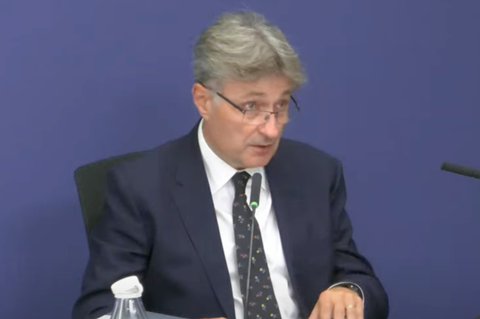A barrister acting for the Post Office in a civil claim against a sub-postmaster has denied ever regarding it as a ‘test case’ for others in the same situation.
The Post Office Inquiry heard evidence on Friday from Richard Morgan KC, who was instructed to handle the case against Lee Castleton in 2006 that resulted in Castleton's bankruptcy.
The inquiry heard earlier in the week that solicitor Stephen Dilley had reflected after the trial that Post Office Limited’s ‘main goal’ had been to obtain a precedent which helped the company defend the Horizon system, which Castleton had blamed for losses at his branch.
The inquiry heard on Friday that there had been a telephone conversation between Dilley and Morgan a month before the Castleton trial in which Dilley said the ultimate driver was to get a judgment ‘to show that the computer system wasn’t wrong and deter other subpostmasters from bringing a claim’.
Morgan said he ‘hadn’t focused on this at all’ and did not recall the information being conveyed to him. It was put to him that he knew this was a test case for getting a ‘clean bill of health’ for Horizon. He denied being given instructions to establish a legal point and said he would have told Post Office he would not do it if those instructions had been given.

In his witness statement, Morgan said: ‘As far as I was concerned, it was a single case to be decided on its own facts, as with every other case. I did not adjust the issues to run it as a “test case”, nor was I asked to run it as a test case for anything (I was only ever instructed to bring a claim to recover amounts owing). The case was not presented to the court as a test case, and in my view the judgment does not read as if the judge treated it as a “test case” of anything.’
Morgan told the inquiry he believed it was ‘commercial madness’ to run a claim for £25,000 losses in the High Court at a cost to the Post Office of £300,000.
The inquiry then saw a note of a telephone conversation between Morgan and Dilley from two months before trial in which the barrister thought ‘we should play some brinkmanship’ and press for a hearing.
Pressed to explain what he was attempting to say at the time, Morgan said he was trying to resolve the case as quickly as possible.
‘You have what is, by High Court standards, a tiny piece of commercial litigation going to trial. You have some generalised allegations that haven’t been particularised and you have some directions for exchange of evidence and exchange of expert evidence,’ he said.
‘It is quite clear that the longer this case drags on, the more of a gaping wound the costs are going to become.’
He denied that the strategy was to ‘ambush’ Castleton with a trial date sooner than he would have wanted, adding: ‘It’s hardly an ambush when everybody has been told about it by the master giving the directions.’
Morgan said he had no recollection of being told by Post Office about criminal proceedings at the time based on shortfalls in the Horizon system. He insisted he would have ceased acting for the client if it had been known that these were not genuine losses.
‘I think from an ethical position I would have been in some difficulty if I thought that I was being asked to run a case that my lay client had no belief in the integrity of the underlying claim.’
The hearing continues tomorrow.


























